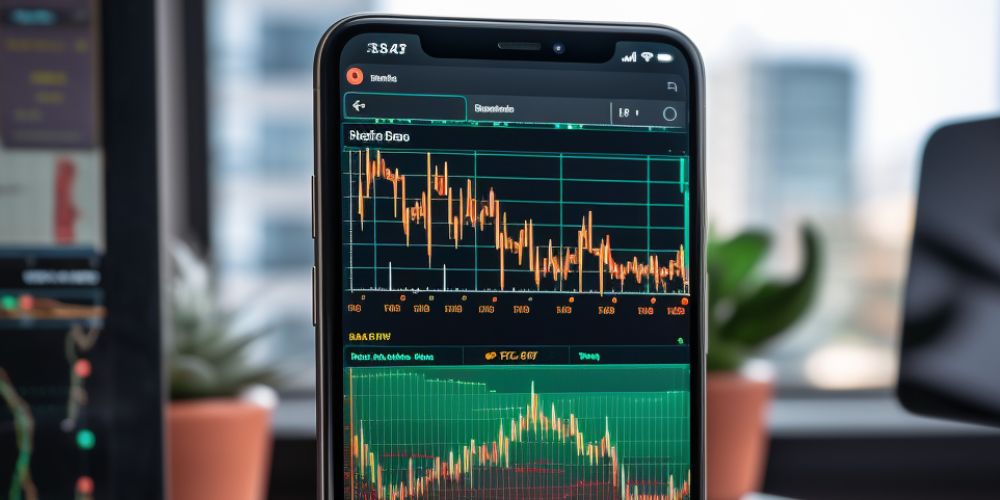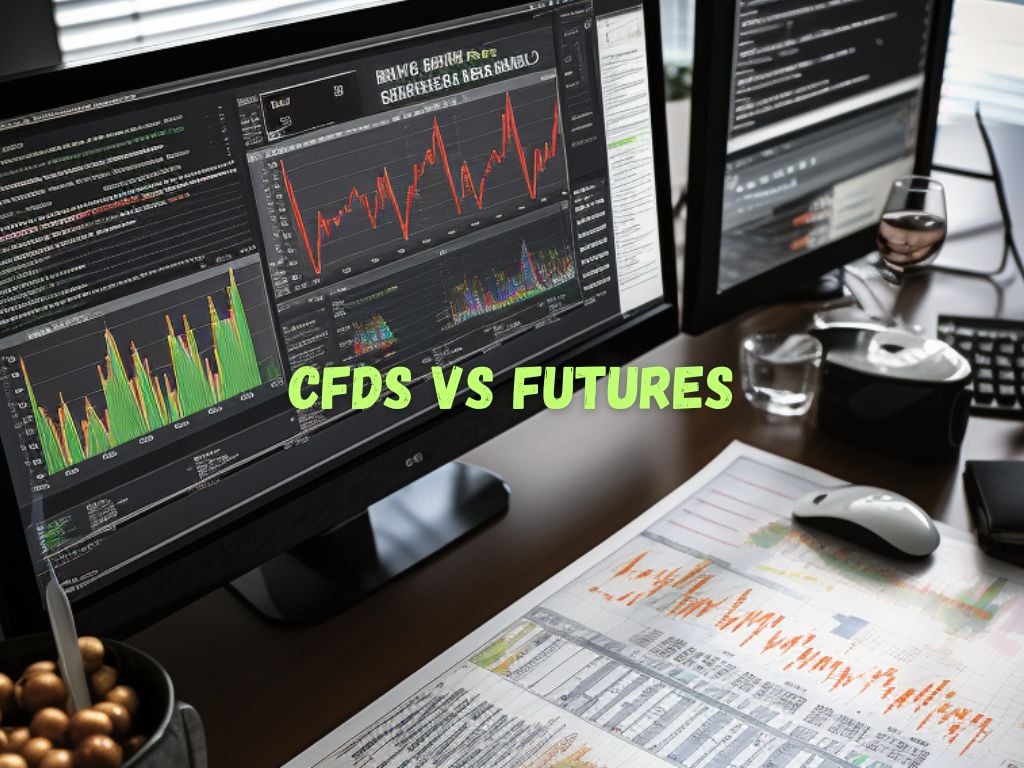The world of financial trading offers a plethora of investment options, and two popular instruments that often cause confusion among investors are Contracts for Difference (CFDs) and futures.
Understanding CFDs vs futures in detail and learning the key differences between these two instruments is crucial for making informed investment decisions.
In this article, we will delve into the details of CFDs and futures, explore how they work, highlight their advantages and disadvantages, and ultimately help you determine which trading instrument suits your needs.
What Are CFDs?
CFDs are derivative products that allow traders to speculate on the price movements of various financial assets without owning the underlying asset.
When trading CFDs, investors enter into a contract with a broker, who agrees to pay the difference between the asset’s current value and its value at the contract’s termination.
Here’s a detailed look at how CFDs work:
Explanation of CFD Trading
CFD trading involves entering into an agreement to exchange the difference in value of a financial instrument between the opening and closing of the contract.
In simpler terms, if you believe the price of an asset will rise, you can buy a CFD, and if you anticipate a price decrease, you can sell a CFD.

How CFDs Work
When trading CFDs, you don’t actually own the underlying asset. Instead, you speculate on the asset’s price movements.
If your prediction is correct and the asset’s value increases, the broker pays you the difference in price. Conversely, if the asset’s value decreases, you pay the difference to the broker.
CFDs are typically leveraged products, allowing traders to gain exposure to larger positions with a smaller initial investment.
Advantages of Trading CFDs
- Leverage: CFDs offer leverage, which means traders can potentially earn higher profits with a smaller initial investment. However, it’s important to consider that leverage can amplify losses as well.
- Diverse Market Access: CFDs provide access to a wide range of markets, including stocks, indices, commodities, and currencies. This allows traders to diversify their portfolios and take advantage of various market opportunities.
- Short-Selling: Unlike traditional investments, CFDs allow traders to benefit from falling prices by selling an asset without owning it first or having to borrow it, as with short-selling.
- Flexibility: CFDs offer flexible trading options, including the ability to open long and short positions, use stop-loss orders, and trade on margin.
Disadvantages of Trading CFDs
- Risk of Losses: The leverage offered by CFDs increases the potential for losses, as even small price movements can have a significant impact on your investment. It’s crucial to carefully manage risk and use risk management tools like stop-loss orders.
- Counterparty Risk: When trading CFDs, you enter into a contract with a broker. As a result, your profits and losses are dependent on the broker’s ability to fulfill their obligations. It is essential to choose a reputable and regulated broker to minimize counterparty risk.
- Financing Costs: Holding CFD positions overnight may incur financing costs, which can eat into profits. It’s important to consider these costs when calculating potential returns on your investments.
What Are Futures?
Futures, on the other hand, are standardized contracts to buy or sell an asset at a predetermined price and date.
These contracts are created and traded on regulated exchanges, and they represent an obligation to fulfill the terms of the contract upon its expiry.
Let’s explore the intricacies of futures trading:
Explanation of Futures Trading
Futures trading involves entering into a contract to buy or sell a specific asset at a predetermined price and date in the future.
Unlike CFDs, futures contracts are standardized and traded on exchanges, providing a more structured and regulated trading environment.

How Futures Work
Futures contracts specify the quantity, quality, and delivery date of the underlying asset. Traders can take long or short positions depending on their market forecast.
When the contract reaches its expiry date, traders either settle the contract in cash or physically deliver the asset.
Advantages of Trading Futures
- Transparency: Futures trading takes place on regulated exchanges, ensuring transparency and fair trading practices. The standardized nature of futures contracts eliminates uncertainties regarding contract terms.
- Liquidity: Futures contracts are traded on established exchanges, ensuring high liquidity and ease of entering or exiting positions.
- Clearinghouse Protection: When trading futures, a clearinghouse acts as a counterparty, guaranteeing the performance of the contracts. This provides added security and reduces counterparty risk.
- Price Discovery: Futures markets facilitate price discovery, as a large number of participants actively trade these contracts, leading to efficient and transparent price formation.
Disadvantages of Trading Futures
- Capital Intensive: Futures contracts typically have a higher margin requirement compared to CFDs, making them more capital intensive. This can limit accessibility for certain investors.
- Limited Market Access: Futures markets primarily focus on commodities, indices, and some financial instruments. If you’re interested in trading specific stocks, CFDs might provide broader market access.
- Fixed Contract Terms: Futures contracts have fixed terms, including the expiration date and contract size. This lack of flexibility may not suit all trading strategies.
CFDs vs Futures: All The Key Differences
Now that we understand the basics of CFDs and futures, let’s delve into the key differences between these two trading instruments:
Trading Mechanism
CFDs: CFDs are derivative products that create a contractual agreement between traders and brokers. Traders speculate on the price movements of the underlying asset without actually owning it.
CFDs are over-the-counter (OTC) contracts, meaning they are traded directly between the trader and the broker.
Futures: Futures contracts are standardized agreements traded on regulated exchanges. These contracts oblige traders to buy or sell the underlying asset at a predetermined price and date.
The exchange acts as an intermediary, matching buyers and sellers.
Contract Size and Timeframe
CFDs: CFDs offer flexibility in terms of position size and duration. Traders can choose the desired contract size, allowing for greater control over exposure to the underlying asset.
CFDs do not have a predetermined expiration date, allowing traders to hold positions for as long as they wish.
Futures: Futures contracts have predetermined contract sizes and expiration dates. The contract size is fixed and standardized, which may limit flexibility for traders.
Traders must adhere to the specified contract terms and may need to roll over or close positions before the contract expires.
Price and Liquidity
CFDs: CFD prices are set by the broker and may differ slightly from the actual market price of the underlying asset. CFDs mimic the price movements of the underlying asset, but traders do not directly participate in the asset’s ownership.
Liquidity can vary depending on the broker and the asset being traded.
Futures: Futures prices closely track the underlying asset’s market price and are determined by the supply and demand on the exchange.
Due to their standardized nature and active trading, futures markets generally exhibit high liquidity, making it easier to enter or exit positions.

Trading Costs and Fees
CFDs: CFD trading typically involves spreads, which are the differences between buying and selling prices set by the broker. Additionally, brokers may charge commissions on CFD trades.
Holding CFD positions overnight may also incur financing costs due to the leverage provided by the broker.
Futures: Futures trading involves commissions, which are fees charged by the exchange for facilitating the trade. Traders also need to consider any exchange fees or brokerage fees.
Financing costs are not applicable for most futures contracts, as they are settled before the delivery date.
Risk and Leverage
CFDs: CFDs offer flexible leverage options, allowing traders to potentially amplify both profits and losses. High leverage increases the risk of substantial losses if the market moves against the trader’s position.
It is important to manage leverage carefully and use risk management tools such as stop-loss orders to mitigate potential losses.
Futures: Futures contracts also offer leverage, but it is generally lower compared to CFDs. The lower leverage in futures contracts reduces the exposure to potential losses.
However, while lower leverage may mitigate losses, it can also limit potential profits.
Factors to Consider when Choosing between CFDs and Futures
When deciding between CFDs and futures, several factors should be taken into account:
Investor Profile and Experience
Assess your risk tolerance and trading experience. Futures contracts tend to have higher complexity, requiring a deeper understanding of market dynamics and contract specifications.
Experienced traders might be more comfortable navigating the intricacies of futures contracts, while beginners might prefer the simplicity of CFDs.
Risk Appetite
Evaluate your risk appetite and determine the level of risk you are willing to undertake. Recognize that leverage in both CFDs and futures can magnify your profits as well as your losses.
If you are risk-averse, you may prefer to opt for lower leverage and potentially lower risk futures contracts.
Trading Objectives
Consider your trading objectives and time horizon. If you are interested in short-term trading or day trading, CFDs might be more suitable due to their flexible contract sizes and lack of expiration dates.
CFDs allow for easy entry and exit from positions, providing greater agility.
On the other hand, long-term investors seeking exposure to specific assets or commodities may find futures contracts more appropriate.
Market Access and Regulation
Check the availability of the assets you wish to trade. Some assets may only be accessible through CFDs or futures contracts.
Additionally, consider the regulatory environment. Different jurisdictions have varying regulations for CFDs and futures trading.
It is important to choose a regulated broker or exchange that offers the desired market access and aligns with your regulatory preferences.
Trading Costs and Fees
Compare the trading costs and fees associated with CFDs and futures contracts. Consider factors such as spreads, commissions, financing costs, exchange fees, and brokerage fees.
It is essential to calculate these costs and evaluate their impact on potential returns to make an informed decision.
Market Analysis and Strategy
Assess the availability of market analysis tools and resources. Some brokers or exchanges may provide comprehensive market research, real-time data, and analysis tools for specific trading instruments.
Consider your trading strategy and select a trading instrument that aligns with your preferred analysis approach.

Asset Class Preference
Determine the asset classes you are interested in trading. CFDs provide access to a wide range of markets, including stocks, indices, commodities, and currencies.
Futures markets primarily focus on commodities, indices, and select financial instruments.
If you have a specific asset class preference, choose the trading instrument that provides broader market access to those assets.
Tax Implications
Consult with a tax advisor to understand the tax implications associated with trading CFDs and futures contracts. Tax regulations may vary depending on your jurisdiction and the trading instrument chosen.
Understanding the tax obligations for each instrument can help you make an informed decision.
By considering these factors, you can evaluate the suitability of CFDs and futures contracts for your trading goals and make a well-informed decision.
It is important to thoroughly research and understand the nuances of each instrument before engaging in trading activities.
Frequently Asked Questions
Why are CFDs illegal in the US?
CFDs are not illegal in the US. However, regulations governing CFD trading vary across different states, and certain restrictions may apply.
What is the difference between CFD and futures spread?
The spread in CFD trading refers to the difference between the buying and selling price of the CFD. In futures trading, the spread refers to the price difference between different contract months of delivery periods.
Are CFDs more liquid than futures?
Liquidity can vary depending on the asset being traded and the broker’s offerings. Generally, highly traded futures contracts tend to have higher liquidity than individual CFDs.
What is the difference between cash CFDs and futures CFDs?
Cash CFDs replicate the movements of the underlying asset, while futures CFDs are based on futures contracts. Cash CFDs have no expiration date, whereas futures CFDs have fixed contract terms.
Conclusion
When it comes to choosing between CFDs and futures, it’s crucial to analyze your trading goals, risk tolerance, and overall investment strategy.
Both trading instruments have their own advantages and disadvantages, and understanding these differences will help you make informed decisions.
Remember to research and choose a reputable broker or exchange, and always practice responsible risk management to protect your trading capital.
By carefully considering these factors, you can take advantage of the opportunities presented by CFDs and futures and navigate the world of financial trading with confidence.


 Tags:
Tags:










